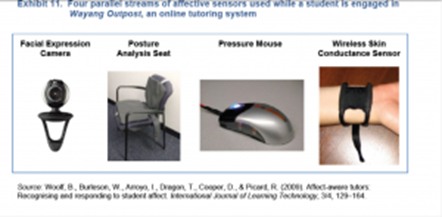News
Politico - Corporations Gathering 10 MILLION Uniqure Data Points on Every Student
January, 2015
Karen R. Effrem, MD - Executive Director
In a chilling article by Stephanie Simon, Politico spilled the beans on how Ed-Tech corporations are gathering frightening amounts of data on our children:
"The amount of data being collected is staggering. Ed tech companies of all sizes, from basement startups to global conglomerates, have jumped into the game. The most adept are scooping up as many as 10 million unique data points on each child, each day. That's orders of magnitude more data than Netflix or Facebook or even Google collect on their users. (Emphasis added)."
-
In recent months, more than 30 public school districts from Bainbridge Island, Washington, to Broward County, Florida, have signed partnerships with a nonprofit called Code.org. The organization gives schools free curricular materials and teacher training to set up computer science classes.
All it asks for in exchange: Data. Lots and lots of data.
Code.org requires that its partner schools turn over up to a dozen years of academic records, including test scores, on every participating student, according to a model contract reviewed by POLITICO. (Emphasis added) -
The NSA has nothing on the ed tech startup known as Knewton.
The data analytics firm has peered into the brains of more than 4 million students across the country. By monitoring every mouse click, every keystroke, every split-second hesitation as children work through digital textbooks, Knewton is able to find out not just what individual kids know, but how they think. It can tell who has trouble focusing on science before lunch -- and who will struggle with fractions next Thursday. (Emphasis added) - "Interactive Health Technologies stores multi-year fitness records on students, based on data from heart monitors they wear in P.E., and integrates them with "unlimited data points" from the classroom, including behavioral and nutrition records."
- "LiveSchool, which markets software that helps schools track student behavior"
-
Consider the popular nonprofit tutorial service Khan Academy. It's free. But users do pay a price: In effect, they trade their data for the tutoring.
"Data is the real asset," founder Sal Khan told an academic conference last fall.
The site tracks the academic progress of students 13 and older as they work through online lessons in math, science and other subjects. It also logs their location when they sign in and monitors their Web browsing habits. And it reserves the right to seek out personal details about users from other sources, as well, potentially building rich profiles of their interests and connections.
These are the same type of sensors pictured from the now infamous US DOE report on Grit, Tenacity, and Perseverance that became so controversial, it was removed from the website, but is available HERE.

The CEO of Knewton arrogantly dismisses the concerns of parents and privacy advocates:
When parents protest that they don't want their children data-mined, Ferreira wishes he could ask them why: Is it simply that they don't want a for-profit company to map their kids' minds? If not, why not? "They'd rather the NSA have it?" he asked. "What, you trust the government?"...
...He once described education as "the world's most data-mineable industry, by far" -- and he has raised $105 million from investors who share that vision. By next year, he expects to be mapping the minds of 10 million students. If he can identify who among them will struggle with fractions next Thursday, he can also recommend resources to help them before they hit that wall.
Ferreira has a tough time understanding how anyone could object to data mining when it has such power.
"It just helps children," Ferreira said. "That's all it does." (Emphasis added).
...He once described education as "the world's most data-mineable industry, by far" -- and he has raised $105 million from investors who share that vision. By next year, he expects to be mapping the minds of 10 million students. If he can identify who among them will struggle with fractions next Thursday, he can also recommend resources to help them before they hit that wall.
Ferreira has a tough time understanding how anyone could object to data mining when it has such power.
"It just helps children," Ferreira said. "That's all it does." (Emphasis added).
His attitude is reminiscent of the chief of the National Center for Education Statistics, Jack Buckley, who basically believes that the data belongs to the feds because of funds received.
He spoke of the "rights of our students & their families to keep their data confidential & secret as appropriate, but also to balance the needs that we have for the massive investment in education, of understanding its returns, of understanding how the system is working, how do we improve it, with the ultimate goal always of improving the educational outcomes of our citizens..."
At the federal level, FERPA needs to be revamped to prevent the loopholes that are now occurring i the regulations about what data is allowed to corporations and the government without consent, but there also needs to be a very strong prohibition on psychological data gathering and the PPRA that prohibits this needs to apply to curriculum and assessments as well as surveys.
At the state level, there needs to be a fundamental shift away from relying on FERPA and a prohibition on all psychosocial assessment and data gathering. As well intentioned as the prohibitions on individual data elements like biometric data may have been in the bill that passed in Florida last year, if ten million elements are being gathered on every child, that will be like trying to bail out the ocean with a teaspoon. Our legislators will have to decide whether to support the privacy interests of our children or the financial interests of corporations.

